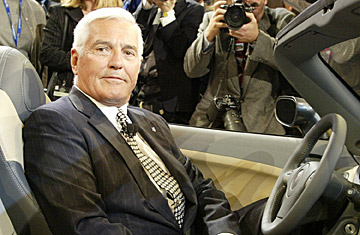
Former vice chairman of the Chrysler Corporation, Bob Lutz
(2 of 11)
GERALDINE LAYBOURNE: But, you know, without content you don't— there would be no television.
I mean, in the early days of television there was a great focus on kids' TV because kids were the best sales agents for television sets. So, I'm always gonna raise the flag for content and—
WALTER ISAACSON: Let me ask you, though. A century from now, is television gonna be something that still looms large? Or is it gonna be sort of an aberration of a distribution system we had in the 20th century and content will find other ways to be distributed?
GERALDINE LAYBOURNE: Well, I don't think any medium ever gets displaced. So, even if we have a wildly different television and it's interactive and, you know, combines the computer—
WALTER ISAACSON: Will we still have networks?
GERALDINE LAYBOURNE: You'll still have networks. You'll still have passive programming 'cause people like it. People are—
RAY BRADY, Economics Correspondent, CBS News: While we're on content, I'll put in a vote for Bill Paley, even though I used to work for him and I'm with CBS.
But, you know, all this argument about hardware and content reminds me of Thomas Edison, who invented the movie camera and said, "The money is going to be in the camera."
And a lot of people in New York who then went to Hollywood said, "No, no, the money's going to be in the content." And they made movies and made far more money than the people making cameras.
So, my point is that Paley brought in terrific talent — Lucille Ball, Jack Benny, all these people — which really made the medium.
And I was there, fortunately, the last few years of his life. He had one rule — you had to be number one, but you had to do it with class and elegance. So, he wanted a winner, but he wanted the content and he wanted quality.
In fact, there was one correspondent who showed up one day in a pretty crummy looking suit. And Paley said to him, "I pay you enough so that you can at least dress decently."
WALTER ISAACSON: Was that you?
RAY BRADY: That was the main—
No, I would not tell that story if it had been me.
WALTER ISAACSON: Which is more important? There were two great things invented this century in terms of entertainment — the movies and television.
RAY BRADY: Right.
WALTER ISAACSON: What's gonna end up being more important.
RAY BRADY: Oh, I think it's going to be dead heat.
I remember when television first came in. All the movie people were very, very worried. "We're gonna be driven out of business. Nobody will go to the theaters. They're gonna sit home and watch television. They won't come to the theater."
And they started coming up with film noir, hoping that that would get the people back in. Well, what happened is both ended up coexisting, maybe not too happily all the time, but both are coexisting.
Hollywood is turning out film-length features for television, and— As, I think, Geraldine said, there's always room for new media, and they all will survive.
GERALDINE LAYBOURNE: I think one of the big names that we haven't talked about is Walt Disney.
WALTER ISAACSON: Everybody has to put in a plug for a former employee, so you can do Walt—
GERALDINE LAYBOURNE: I never worked for Walt.
WALTER ISAACSON: You know.
GERALDINE LAYBOURNE: I never worked for Walt, although some say he's still there.
WALTER ISAACSON: I think he's still there.
Let's get Geraldine on Walt Disney, and then we'll move on to you, Bob.
GERALDINE LAYBOURNE: But here was— here was a man who had a very broad view of entertainment. He wasn't in any one sector. He started in movies. He invented play-space entertainment. He invented the theme park.
WALTER ISAACSON: You mean theme parks. Yeah.
GERALDINE LAYBOURNE: Right, but that's a whole category of entertainment that's very important to not only Americans, but people around the world.
WALTER ISAACSON: Most important person in the cinema industry, you think? Or—
GERALDINE LAYBOURNE: Well—
WALTER ISAACSON: Louis B. Mayer, Jack Warner?
GERALDINE LAYBOURNE: You know, I have— I have a tendency to look at things more broadly from an industry like cinema. I look at entertainment.
And I think in terms of family entertainment Walt Disney did the most to innovate in that arena.
WALTER ISAACSON: Bob?
ROBERT A. LUTZ: Well, I was just going to make a point— I agree with Disney, by the way, because one of the things I think we have to be careful with is judging significant— the most significant people in this century is that we don't take a uniquely American perspective.
And I think some of the people who have been named in the television side provided content for U.S. television whereas TV is a worldwide phenomenon and some of these names, if you asked the Japanese or the Germans, Latin Americans, South Africans, or all of the people in the former Soviet Union, they would not have heard of any of these names.
WALTER ISAACSON: Yeah, I agree we have to be global, but—
